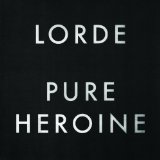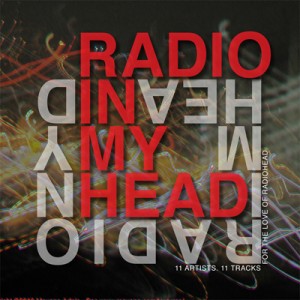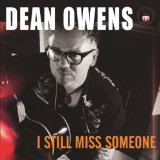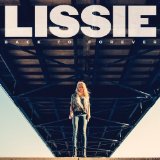 The troubling thing about Lorde is that she’s only sixteen, about to turn seventeen at the time of writing. This, her debut album, sounds like the work of someone in their mid-twenties which isn’t exactly middle aged either but the experience that comes with age does help reinforce artistic credibility, it seems. But this a prejudice and should therefore be discounted. Childhood and very early adulthood is experienced differently based on environmental and social factors and kids are no longer just kids; the definition has become blurred. Exposure to almost everything is effortlessly achieved whether you are in control of what you are experiencing or not and kids now worry about feeling too old, to quote Lorde here, at the age of 16. Her worry is our worry, her talent is that she knows how to create brilliant, massive pop songs.
The troubling thing about Lorde is that she’s only sixteen, about to turn seventeen at the time of writing. This, her debut album, sounds like the work of someone in their mid-twenties which isn’t exactly middle aged either but the experience that comes with age does help reinforce artistic credibility, it seems. But this a prejudice and should therefore be discounted. Childhood and very early adulthood is experienced differently based on environmental and social factors and kids are no longer just kids; the definition has become blurred. Exposure to almost everything is effortlessly achieved whether you are in control of what you are experiencing or not and kids now worry about feeling too old, to quote Lorde here, at the age of 16. Her worry is our worry, her talent is that she knows how to create brilliant, massive pop songs.
There are two very big songs on the seductive, and that it is the right word, “Pure Heroine”. The bigger of the two, “Tennis Court”, begins with Lorde asking the question ‘don’t you think that’s it boring when people talk?’ Although the statement itself is nonsensical without context, she has already stared you straight on and in the space of five seconds you’re captive. Against a bare hip hop beat, wide screen synths and the lonely sound of a repeated and dominant ‘blip blip’ from an imagined early computer game (Atari tennis would be topical of course), the steely-eyed verse can only serve as a perfect appetiser for the sublime chorus. Punctuated by a drunk and slowed down ‘yeah!’ borrowed from the current rap sound favoured by ASAP Rocky and already hijacked by Miley, Lorde is intoxicatingly confident and dominates the song’s boulder-like hook. Interesting that the current number one in the USA, the appropriately majestic “Royals”, and the second very big song here, is lyrically a reaction against hip hop culture which, in the States at least, is a dominant chunk of popular culture (see Miley again). It’s all rumbles and clicks, equal parts Peggy Lee, Lana Del Rey and Lykke Li (vocally they sound very similar, you would never imagine that Lorde is American let alone a New Zealander) but musically it’s as much a classic Rihanna song as anything else currently in the top ten, more “Umbrella” than “Only Girl in the World”.
The remaining eight songs on the self-written “Pure Heroine” are variations on the musical and lyrical themes established in these two songs and apart from a couple of misfires (the album closer ,”A World Alone”, is too heavy-handed in its attempts to demonstrate one of the album’s key subjects of alienation) the quality is very high throughout. The cleverly repetitious “Ribs” is the only track with a recurring and solid dance beat but is drenched in teen melancholy and on the booming and hypnotic “Team”, Lorde lyrically avoids the tirelessly reproduced ‘up in the club’ line by announcing ‘I’m kinda over being told to throw my hands in the air’. “Glory and Gore”, probably owing the most to Del Rey (the ultimate magpie) divides verses up sonically between hip hop via The XX cut with indie pop percussion practices of seemingly banging hard on a saucepan. These clever and effective musical tricks, and there are many, help what could have been a samey-sounding set remain fresh and inventive. “White Teeth Teens” has a 60’s girl group roll and sneer until the confessional line ‘I’ll let you into something big, I’m not a white teeth teen, I tried to join but never did, the way they are and the way they seem; it’s something in the blood’. “Buzzcut Season” contains the lovely line ‘I remember when your head caught flame, it kissed your scalp and caressed your brain’ and demonstrates Lorde’s skill with words, lyrics that can create a fluid and beautiful image.
The worldwide success of Ellie Maria Lani Yelich-O’Connor, her real name, puts her in the post, post-modern situation of becoming what she appears to at least mock here and, at times, hate. A star who is, because of her ability to not only perform but also write and reproduce, is a highly desirable commodity. There is an innocence to Lorde’s “Pure Heroine” which she will be unable to return to, her school friends and their anti-gang, their language and rejection of the mainstream; now she is the mainstream. Her ability to compose and express these experiences in such an accessible and grounded but haunting style may be her downfall but our gain. Ultimately Lorde will just have to decide just how far she wants to go as at the moment there really would appear to be no limits for this extremely talented and intriguing young woman.
 I first heard about the Radio (in my) Head project over a year ago when I met up with a couple of the people involved in putting the album together. It’s fair to say that it’s been a fairly long flash-to-bang time, but the end result certainly is a cracker (sorry). We’ve been publishing fairly regular updates on the album’s progress and reviews of the singles released so far (as well as a few unrelated singles from the artists involved), so the final release could have been an anti-climax; it isn’t, because this is a very, very good album. Normally, I’d give you a bit of background on the artists, but there are eleven of them, so you can find all you need to know here. I try to avoid track-by-track reviews as well, but there really isn’t any choice here, so I’ll start at the beginning, leaving out the songs we’ve already reviewed as singles.
I first heard about the Radio (in my) Head project over a year ago when I met up with a couple of the people involved in putting the album together. It’s fair to say that it’s been a fairly long flash-to-bang time, but the end result certainly is a cracker (sorry). We’ve been publishing fairly regular updates on the album’s progress and reviews of the singles released so far (as well as a few unrelated singles from the artists involved), so the final release could have been an anti-climax; it isn’t, because this is a very, very good album. Normally, I’d give you a bit of background on the artists, but there are eleven of them, so you can find all you need to know here. I try to avoid track-by-track reviews as well, but there really isn’t any choice here, so I’ll start at the beginning, leaving out the songs we’ve already reviewed as singles.
The opening track, “The National Anthem” by STRNGRS, which eases the listener into the album doesn’t depart radically from the “Kid A” original but replaces the funk groove with a rockier, heavier feel, a bass sound that wouldn’t be out of place on a Kasabian track and a vocal with more than a nod in the direction of Brian Molko. You just know that Black Casino and the Ghost will put their own very individual stamp on “Packt like Sardines in Crushed Tin Box” with an incredibly heavy bassline and Elisa Zoot’s breathy but powerful vocals driving the song along; it doesn’t disappoint.
Stoneface Travellers are the first band to really make a song their own with a version of “My Iron Lung” that replaces the original’s “Dear Prudence/ Lucy in the Sky…” guitar sounds with straight ahead blues riffing. Where the original breaks down into a noisy middle section, this becomes quieter ahead of an extended solo from Emile Gerber. It’s the first radically different version on the album. Yoya’s take on “Wolf at the Door” replaces the mainly acoustic instrumentation of the original with samples played backwards and forwards, loads of electronic sounds and a vocal which goes from pure to fractured in the space of one line; it took Marianne Faithfull twenty-five years to do that.
There are good, and very good vocal performances on the first half of the album, but the first truly outstanding vocal is on Amy Hannam’s version of “Street Spirit (Fade Out)”. The song builds gradually from a chiming guitar intro with the piano providing the bass and a very close-miked vocal which demonstrates the quality and power of Amy’s voice, particularly when joined by the perfect harmonies in the chorus. It has a very 70s prog feel at times; there’s a passage where the vocal is reminiscent of Pink Floyd’s “Great Gig in the Sky” and the piano is straight out of “Tubular Bells”. And, yes, it does fade out. Skeye’s version of “Karma Police” again has a retro feel using traditional rock band instrumentation and adding organ to the mix in traditional 70s style. The vocal is pure and clear until pushed hard when it becomes more raw and rocky and it’s another song stamped with the style of the performer.
Malin Andersson’s version of “Exit Music (For a Film)” has electric and acoustic guitars providing the backing for Malin’s breathy vocal (close-miked again) before adding a violin, in contrast to the original’s drums and synths in the final third of the song ; it’s another excellent version. Alexey Zelensky tackles the only non-album track of the project, “Staircase”, which was released on “The Daily Mail” single. Many of the elements of the arrangement are similar to the original, including the UK garage/drum ‘n’ bass drum patterns and chiming guitars but Alexey adds some powerful multi-tracked lead and backing vocals and guitar. And I think you can guess what’s coming at the end of the album.
The closer is Bethan Mills’ version of “Creep” and it’s a classic. I must admit to hearing a demo version of this a few months ago and it’s been really difficult to keep this one secret; it’s a powerful and original take on the song that Thom Yorke seems to hate so much now. The song opens with understated piano before Bethan’s (close-miked again), intimate vocal comes in. Drums and bass kick in after the first chorus, but the vocal still punches through the arrangement. There’s a breakdown back to the opening arrangement on the “Whatever makes you happy…” verse before an epic finish featuring a big guitar solo with squalls of controlled feedback drop out to leave a plaintive vocal to end the song. I’m a huge fan of the Chrissie Hynde unplugged version of “Creep”, but I think this version just shades it in a straight fight.
So, it could have easily been a bunch of tired retreads of Radiohead songs but it’s much, much more than that. Project curator John O’Sullivan has pulled together a bunch of people from all over the world to put their own stamp on their favourite Radiohead songs. Listening to the album for the first time, you have no idea of what’s coming next and the surprises are all pleasant. There aren’t any average tracks here; they’re all well thought-out and very well performed. My personal highlights are Amy Hannam’s version of “Street Spirit” and Bethan Mills’ version of “Creep”, but I’ll happily listen to any song on this album.
The good news is that from October 29, you can hear the album in all its glory by downloading it on iTunes here.
What are the odds on Portis(in my)Head next?
 My experience over the last couple of years has taught me that when something turns up for review from Dean Owens it’s always worth a listen and the single, “I Still Miss Someone”, is no exception. The song is taken from Dean’s classic album of Johnny Cash covers “Cash Back: Songs I Learned from Johnny” and is released to tie in with his current mini tour with his Drumfire labelmate, Ags Connolly. I’ve already said in the review of “Cash Back…”that there isn’t a bad song on the album, so you know that the lead track is a good version of a Johnny Cash and Roy Cash Jr. Song which is well arranged and tastefully played. It’s a great album track, but I’m not really sure that it’s a single.
My experience over the last couple of years has taught me that when something turns up for review from Dean Owens it’s always worth a listen and the single, “I Still Miss Someone”, is no exception. The song is taken from Dean’s classic album of Johnny Cash covers “Cash Back: Songs I Learned from Johnny” and is released to tie in with his current mini tour with his Drumfire labelmate, Ags Connolly. I’ve already said in the review of “Cash Back…”that there isn’t a bad song on the album, so you know that the lead track is a good version of a Johnny Cash and Roy Cash Jr. Song which is well arranged and tastefully played. It’s a great album track, but I’m not really sure that it’s a single.
However, it’s not the only track on the single; there are three more songs here. “Virginia North” is a Dean Owens original which is interesting, but wouldn’t feature on a “Best Of…” and the two remaining tracks move progressively towards the basic elements of the songs. On “Folsom Prison Blues”, it’s just Dean and an acoustic guitar, and it works perfectly; there aren’t any unnecessary distractions from a powerful song and vocal performance (including Dean’s version of the trucker’s gear change, where he jumps an octave instead of the usual tone or semitone). The final track on the single, Rod McKuen’s “”Love’s Been Good to Me”, is a real surprise; it’s an a cappella version. There’s nowhere to hide here and Dean absolutely nails it; you can’t strip it back any more than that and it’s a beautiful song sung by a great voice. Whether you already have the album or not, this single’s worth having on the strength of the last two tracks.
“I Still Miss Someone” is out October 28 on Drumfire Records (DRMFR013).
 American synth trio Au Revoir Simone have stepped out from the shadows a little on “Moves in Spectrums”, their fourth album in a decade. They were never a dark band, don’t let the adoration of superfans like David Lynch confuse you, but they were introverted and their sound straightforward in its small way where basic electronics meshed with sympathetic but independent, occasionally folky female leads. The trick was that little thorns would stick and cut occasionally if you weren’t careful and sadness would completely dominate and then just evaporate. It was this that made them special and why so many would always come back for more of something that they couldn’t quite put their finger on.
American synth trio Au Revoir Simone have stepped out from the shadows a little on “Moves in Spectrums”, their fourth album in a decade. They were never a dark band, don’t let the adoration of superfans like David Lynch confuse you, but they were introverted and their sound straightforward in its small way where basic electronics meshed with sympathetic but independent, occasionally folky female leads. The trick was that little thorns would stick and cut occasionally if you weren’t careful and sadness would completely dominate and then just evaporate. It was this that made them special and why so many would always come back for more of something that they couldn’t quite put their finger on.
Over the course of three albums Au Revoir Simone had gone from their relatively lo-fi, cheapo keyboard aesthetic to something far more expansive and expensive without ever compromising what is essentially their sound. Their last “The Bird of Music” was in many ways their most experimental but almost their most whimsical; it had more sonic clout than the previous two releases but it was also hard to escape the feeling that three albums from the trio may be enough. “Moves in Spectrums” goes some way in proving this hunch to be somewhat short-sighted and premature. Opening track “More Than” with its menace and prowl and dominant drum pattern and droning synth has only the bright harmonised chorus that reveals the band’s identity and it sounds great. “The Lead is Galloping” with its interestingly reversed, request hook of ‘Nobody put your hands up’ is a lolloping, sarcastic low self-esteem anthem and both “Just Like a Tree” and “Somebody Who” (featuring some all too brief but totally gorgeous cowbells) plunder satisfyingly rich-sounding, 80’s electro chart pop. Swirling and ‘ha-ha-ha-ha’ voiced “Boiling Point” is a commendable homage to Laurie Anderson and “Crazy” has the most incredible use of synths as if they were guitars that you will have heard for a while.
There are some odd decisions made here though and this is something all of Au Revoir Simone’s previous albums suffer from; plonking a track in, three in this case, whose inclusion seems to make little sense to anyone other than, I presume, the band themselves. Personal songs or experimentation are one thing but “We Both Know” is a very boring, almost five minute, semi-instrumental that goes nowhere, vocals popping up in the last minute and a half to be forgotten forever. “Love You Don’t Know Me” is that one line repeated over a minor MOR electronic keyboard melody for three minutes and album closer “Let the Night Win” although superficially vibrant, is not exactly captivating. It’s almost a complete certainty that the band have better material but they’ve decided that these tracks are the ones that should be heard; it’s frustrating and feels oddly self-indulgent.
“Moves in Spectrums” is an album where the good is some of Au Revoir Simone’s best and the average is still present. Every album has been more interesting than the last and this is their most cohesive in many ways and certainly the most assertive, a much needed attribute that the band required to move forward and to avoid the sometimes all too appropriate ‘nice’ tag. They are currently one of only a few female groups making this particular type of warm, slightly eccentric electronic music and therefore the competition may not be great but they do still lead in their genre. The feeling now though is whether Au Revior Simone can find that one brilliant album that they surely have in them as sadly, despite the very strong opening, this isn’t it.
 This is singer-song writer, Lissie’s second album after her acclaimed 2010 debut, “Catching a Tiger”. That album branded Lissie a ‘folk’ artist, but her follow-up, shows she’s made of much more musical variety. ITunes brands it ‘folk/country’ but it’s probably more ‘rock/pop’. Much of the production duties fall to the producer of REM and Snow Patrol and you can tell this, in fact it’s the production where I find fault, the album sounds rather muddy and crowded throughout, especially in the bass tones, lacking the light touch of her first effort. The sound is more drivetime-friendly and stadium-ready; I don’t want to be like a Dylan fan erupting in rage at his first electric album, but if you like this type of Americana, there is plenty to sing along to. Arguably, it might be hard to produce a unique sonic experience anymore with the standard guitars, bass, drums and keyboard, even with the range of tempos, themes and moods we have here.
This is singer-song writer, Lissie’s second album after her acclaimed 2010 debut, “Catching a Tiger”. That album branded Lissie a ‘folk’ artist, but her follow-up, shows she’s made of much more musical variety. ITunes brands it ‘folk/country’ but it’s probably more ‘rock/pop’. Much of the production duties fall to the producer of REM and Snow Patrol and you can tell this, in fact it’s the production where I find fault, the album sounds rather muddy and crowded throughout, especially in the bass tones, lacking the light touch of her first effort. The sound is more drivetime-friendly and stadium-ready; I don’t want to be like a Dylan fan erupting in rage at his first electric album, but if you like this type of Americana, there is plenty to sing along to. Arguably, it might be hard to produce a unique sonic experience anymore with the standard guitars, bass, drums and keyboard, even with the range of tempos, themes and moods we have here.
Despite the carpet-bombing of her marketing team, Lissie has been rather over-looked, although “When I’m Alone” made it to iTunes best song of 2010. Perhaps this is partly due to her not being either air-brushed or especially grungy, but she is starting to sell out stadiums across Europe and is currently performing dates in the UK. This fuller sounding set of 12 songs (some extras with the deluxe version), are all originals written by California-based Lissie and the band. The lyrics and music are all good, launching with the uptempo “The Habit”, ‘You’ll never get out/And you’re always gonna be an addict/ The heart breaks way before the habit’ and it’s these touches lyrically that make the album, along with her vocal timbre.
I don’t have a favourite amongst these tunes but there’s no real filler either. The singles are here, “Further Away (Romance Police)” and “Sleepwalking” and they’re bouncy enough to get Radio 2 airtime, but also check out the slower “They All Want You” for a greater exhibition of Lissie’s voice. This is not a concept album but a collection of songs about relationships and issues, including low pay, the anthemic “I Don’t Wanna go to Work” and the glamour industry, “Shameless”. (‘I don’t want to be famous, if I got to be shameless’).
I was going to award this album 4*, but that’s the figure I gave the first album and I do believe that’s better, or perhaps I prefer her earlier, more acoustic sound, so maybe just 3.5 stars for Back To Forever. Out now.
 London based indie electro brats New Young Pony Club are now just NYPC. The abbreviated name also reflects their reduction from a five-piece band to a duo; original members lead singer Tahita Bulmer and producer Andy Spence remain. They still sound like New Young Pony Club but this, their third album, is by some distance their most accomplished, musical and exciting to date. It seems that the trimming away of excess views and voices has bought about a new-found sonic richness and clarity with a welcomed ability to craft the kind of songs that you always hoped they would make but never quite managed to deliver.
London based indie electro brats New Young Pony Club are now just NYPC. The abbreviated name also reflects their reduction from a five-piece band to a duo; original members lead singer Tahita Bulmer and producer Andy Spence remain. They still sound like New Young Pony Club but this, their third album, is by some distance their most accomplished, musical and exciting to date. It seems that the trimming away of excess views and voices has bought about a new-found sonic richness and clarity with a welcomed ability to craft the kind of songs that you always hoped they would make but never quite managed to deliver.
The tough and tantalising opener, “Hard Knocks“, with its wonderfully disorganised lyrics (‘waiting for, hard knocks, the school of, I think you are) is instantly recognisable as the group due to its monotone, perpetually pissed off vocal, heard first in 2009’s omnipresent “Ice Cream”. On NYPC’s first single “You Used to Be a Man” which is a lesson in building, electro minimalism there are multiple harmonies throughout, a middle eight and a melody that will not want to leave your head willingly. ‘Do you understand how hard it is to stand and watch you fall hard?’ goes the cheeky, smartarse hook and although somewhat economic in structure it bears testament to how far their song writing skills have developed over five years.
“Sure As The Sun” has humour (‘last night we went to a model home, we thought it was love, it was just a mirage’) funky bass and sheets of electro parps, defining the point where Talking Heads and the Tom Tom Club merge. “I Came Through For You” has muted “Planet Rock” style drum machine booms and “Things Like You” relies on the staple Bulmer delivery before it shifts key and, along with Spence, a romantic and wistful, pure pop chorus unexpectedly emerges. Stand-out track “Now I’m Your Gun” with its seductive and assertive plucked synth chords and accordion appearance is sleek and precise. The beautiful and modern electronics, albeit inspired mainly by three decades worth of genre twisting artists and music, are expertly played and gleam throughout the album.
“Play Hard” with its hard-nosed, new wave guitar and vocals can be traced back to the B52’s first two completely essential and ground-breaking albums when Kate Pierson and Cindy Wilson sang about fish as gifts, dirty back roads and not dancing like cheese; weird and wilfully sexy. The final two minutes of “Everything Is” are pure snapping beats and steel drums which will undoubtedly bring to mind The Knife but NYPC have made something life-affirming and relatable as opposed to the overwhelming impenetrable coolness of the Stockholm duo’s “Shaking the Habitual” album from earlier this year. It’s sad that Bulmer and Spence won’t garner the same amount of media coverage and adulation. Only on the final track, “L.O.V.E.”, does the steam begin to run out and things start to plod but by this point it is easily overlooked.
At times it felt like New Young Pony Club were more part of an East London ‘fashion slash’ mob rather than a standalone, individual musical entity. Their debut was gimmicky and sounded only half-finished and the (surely) ironically titled “The Optimist” was heavy with something other than tunes and in retrospect the disharmony within the group at that time could have been responsible. NYPC, though, are the sound of artists finally snapping together the crucial matching and previously lost parts forming a new, perfect whole. Streamlined, efficient and pleasure-seeking, it’s a beautiful and intelligent thing.
 One of the benefits of being a member of the Riot Squad is that you get to visit all sorts of weird and wonderful venues and (mostly) hear great new bands; sometimes you even get both at the same time. So this time it’s Buffalo in Islington, a cellar bar with enough PA to ensure the bands are loud and a room that you could probably cram 150 people into if you had a big shoe-horn. We were invited to go and have a look at Civil Protection, who were first on the bill but thought it was only polite to check out the other three bands on the bill.
One of the benefits of being a member of the Riot Squad is that you get to visit all sorts of weird and wonderful venues and (mostly) hear great new bands; sometimes you even get both at the same time. So this time it’s Buffalo in Islington, a cellar bar with enough PA to ensure the bands are loud and a room that you could probably cram 150 people into if you had a big shoe-horn. We were invited to go and have a look at Civil Protection, who were first on the bill but thought it was only polite to check out the other three bands on the bill.
Sound Off played a set that was musically solid but not particularly strong vocally, while Punch and Judy featured original material plus a couple of covers including the song you couldn’t get away from this summer, “Get Lucky” which they rocked up a bit at the expense of its funky feel and it sounded pretty good. Of the three, Vera Lynch impressed most. They describe themselves as dark alt-surf-garage rock with a sprinkling of psychedelia; the musicianship is very high quality, the songs are strong and they have a very charismatic frontman and I’m sure they’ll be featuring here in the near future.
Civil Protection are a five-piece from Yorkshire (bass, drums, three guitars and occasional vocals) and they released their debut album, “Stolen Fire” earlier this month. They’ve been compared to post-rock bands like Mogwai and This Will Destroy You, but there’s probably a bit of Sigur Ros in there as well. It’s impossible to describe what they do as songs, because there aren’t a lot of vocals; soundscapes is probably better or, if I’m feeling really pretentious, tone poems.
The set opens with the quietly haunting “Monedula” and, as on the album, eases gently into the opening of “Stolen Fire” which builds layer on layer, guitar on guitar using all of the band’s dynamic range. “My Memories will be Part of the Sky” starts like a piledriver before easing back into a build-up starting with a melodic bass line. “Many Moons Ago” and “Redrawn” have similar structures, starting slowly and gradually adding textures (although “Redrawn” does it twice) before hitting a peak and releasing the tension with a gentle coda. And that’s it; thirty minutes and five pieces.
Civil Protection live are a collage of textures and layers of guitar (and bass) parts with a huge dynamic range. The band move effortlessly up through the gears from one clean, quiet guitar to the whole band playing at full power in a live setting with as much confidence as on the album and somehow convey emotional states without using lyrical content. The changes of pace and levels throughout the short set ensure that the audience is always attentive, waiting for the next move. You should make the effort to get out and see Civil Protection live as soon as you can but if you can’t do that, then get yourself a copy of “Stolen Fire”.
 At some point over the last six months Miley Cyrus has stared the current state of Pop Culture directly in its confused and salacious eye and declared ‘it’s on!’ The combination of a short haircut (I know), high cut leotards (I know!), two very good songs, twerking and the most attention hungry VMA performance in years has managed to create the same impact, the same level of horror and disgust as Madonna did when she first rolled around an empty stage in a wedding dress singing “Like A Virgin”, also at the VMAs, in 1984. Both artists understand the rules and both appear to break many when really they know exactly how much they can get away with. Star power remains as such only when the connection is fully made and maintained and right now Miley Cyrus wants your attention all the time; “Bangerz” will go a long way in determining whether she gets it or not.
At some point over the last six months Miley Cyrus has stared the current state of Pop Culture directly in its confused and salacious eye and declared ‘it’s on!’ The combination of a short haircut (I know), high cut leotards (I know!), two very good songs, twerking and the most attention hungry VMA performance in years has managed to create the same impact, the same level of horror and disgust as Madonna did when she first rolled around an empty stage in a wedding dress singing “Like A Virgin”, also at the VMAs, in 1984. Both artists understand the rules and both appear to break many when really they know exactly how much they can get away with. Star power remains as such only when the connection is fully made and maintained and right now Miley Cyrus wants your attention all the time; “Bangerz” will go a long way in determining whether she gets it or not.
As it often the case with these kinds of post-Disney reinventions, Miley Cyrus’ juggernaut of an album (to the Cyrus uninitiated it may seem as though this is her debut when in fact it’s her third album) is steered by the r’n’b producers and song writers du jour, in this instance relative newcomer Mike Will Made It and the evergreen Pharrell Williams. In the case of Williams it features some of his most engaging work in a long time and MWMI shows a diversity to his sound not yet demonstrated on such a vast level. Importantly they understand how to push and develop the pop component and therefore, in this instance, the artist. The surprise for many will be Miley Cyrus herself, the overbearing sound of controversy (Sinead O’ Connor is on her fifth ‘open letter’ to Cyrus at the time of writing, maybe the next should be sealed) having the negative effect, along with several positives of course, of making her hard to hear. Cyrus can really sing, passionately and with humour and drama when required or she feels like it; she is extremely present throughout; something that artists such as Britney Spears or Rihanna can still struggle with.
The first half of the deceptively named “Bangerz” (it’s a fifty-fifty ballad and up-tempo split) is not the strongest. The two massive singles which both feature early on certainly stand out; the opposing ends of the Cyrus vehicle, they are two of this year’s best. Opening the album with a ballad, the “Ray of Light” drum machine skittering “Adore You” is brave but its bland fawning won’t pull you in. The Salt n Pepa-indebted title track featuring a creamy sounding Britney Spears and the twangy, doesy-doe of “4×4” (containing the bizarre lyric ‘driving so fast about to piss on myself’, one of many very odd moments) are both gimmicky and therefore disposable. Unlike the fantastic “Hollaback Girl” (Gwen Stefani) from which this genre was partly born, both songs have forgotten to include a decent chorus. “My Darling” is a mawkish mess and an, albeit imaginative, attempt to uptake Ben E Kings “Stand By Me”.
“#GETITRIGHT” just about sums up the remainder of “Bangerz”. A joyous and naive, guitar-led groove which captures what Madonna was aiming for when she worked with Pharrell but failed to achieve on her flat attempt at urban pop, “Hard Candy”. Williams here produces one of the very best, if not the most triumphant track, on the album with Cyrus sounding ecstatic and utterly contagious. “Drive” is an appropriately named juddering and in turn undulating, excellent metallic ballad. The melancholic drop at the end of the lyric ‘drive my heart into the night, you can drop the keys off in the morning’ hits hard, twerking it seems only being part of Miley’s increasingly sad story. “FU” is another deranged, “I Put A Spell On You”- riffing and swinging show tune underscored by a whomp, whomp dubstep and “Do My Thang” is “We Can’t Stop”’s trappier and more bratty cousin; ‘I’m a southern belle, crazier than hell’. Indeed.
The two tracks which end “Bangerz” are interesting in that they are ballads which I imagine could have appeared on Cyrus’ earlier releases before her ultimate rebirth, the only songs here that this may apply to. I haven’t heard any of Miley Cyrus’ material from this time as I don’t feel that it’s necessary (and I don’t think I would enjoy it) but there is a strong, country feel to them and this is after all a strong part of Cyrus’ heritage (god-daughter of Dolly Parton and daughter of “Achy-Breaky” father Billy Ray and all). “Maybe You’re Right” is more traditional in sound and song structure where “Someone Else” is an insane rave ballad with speed -sung verses and staccato stabs of vocal puncturing the chorus, It fades on a repeated, whooshing synth noise and the album ends; it is satisfyingly odd.
There are probably two more number one songs here to follow on from the two already achieved before the album was released and means that in 2013 Miley Cyrus is a phenomenon. She can follow in the footsteps of Britney, Beyonce, Gaga and, lest we forget, Madonna. All of those artists understand and luxuriate in artifice and have perfected the other art of being worshipped. They also share a seemingly innate understanding of what constitutes the right song and how to fully inhabit it. Right now at least, Miley Cyrus has also synced into their groove and “Bangerz” is the highly enjoyable but flawed soundtrack that will accompany her to the next instalment. Whether it will be as engrossing as this one, who knows so I would suggest that you begin to listen and start to fall in love with her, at least for now.
 Glasser’s second full-length album is less touchy-feely than her indie electro 2011 debut, the wondrously rich and textured “Ring”. With lead singer Cameron Mesirow now cast as a high glamour, high concept academic, ‘”Interiors” is Glasser’s attempt to interpret human experiences with man-made environments, structures like New York’s Guggenheim maybe, and channel them into predominantly man-made music. It’s not as labour intensive as it sounds and on the whole is not a difficult album to listen to; it’s certainly more aloof than her previous work but concessions to a more nurturing and familiar sound do finally rise to the top. There is also a triptych of songs about windows.
Glasser’s second full-length album is less touchy-feely than her indie electro 2011 debut, the wondrously rich and textured “Ring”. With lead singer Cameron Mesirow now cast as a high glamour, high concept academic, ‘”Interiors” is Glasser’s attempt to interpret human experiences with man-made environments, structures like New York’s Guggenheim maybe, and channel them into predominantly man-made music. It’s not as labour intensive as it sounds and on the whole is not a difficult album to listen to; it’s certainly more aloof than her previous work but concessions to a more nurturing and familiar sound do finally rise to the top. There is also a triptych of songs about windows.
“Shape” opens up with languid, humming synths and swaying coos. It’s eerie but not alienating and is Glasser’s starting point before she reaches beyond her imagined comfort zone ‘I live on the beach, water surrounding me, and it’s got too deep …my home has no shape, nothing to sustain me, but it keeps me safe from imagined pain’. “Design” calls to mind Roisin Murphy’s work with Mathew Herbert in its vocal tics and sounds of machines trying to represent nature and design and the seductive use of strings and sliding synth effects on “Landscape” provoke and engage. “Keam Theme”, the one true dancer here, uses midtempo house beats and hi-hats and although Bjork references come far too easy (the similarities between this and “Vespertine” are numerous) it’s hard not to think of “Hyperballad” as its older, more street smart, sister.
The aforementioned “Window i” with its gentle pads and clicks is intimate but hollow and “Window iii” and “Window ii” (in that order) are both short and serve more as interludes but they are also redundant here. The promised visuals that are due to accompany the upcoming tour may help to explain their presence but, unaccompanied at least, it’s a minor experimental indulgence. More positively they also usher in the album’s recurring use of Cantonese mandolins which, along with saxophone, helps inject the steely soundscapes with human touches. Far-eastern musical influences were also heard in “Ring” but the tribal and more harmonious and inclusive sound of that collection is almost entirely absent from “Interiors”. The slower songs towards the album’s end are quite lovely though, “New Year” in particular has a surprisingly romantic and old fashioned melody with a traditional song structure and is in direct opposition to the somewhat lonely sounding, shiny and self-contained first half.
Glasser has made an album that positions her among the more experimental art-pop genre of electronic artists such as Julia Holter and Laurel Halo, it actually sees her sitting precariously between these two specific artists; the surreal, lyrical nature of Holter meets the electronic forward thinking soundscape obsessions of Halo. “Interiors”, however, falls short of its aims and ultimately doesn’t become the original and career-defining album that it could have been; the material is not consistently strong enough to permit this. Glasser will no doubt bring this music to life over the next year or so with touring and a continuation of the already captivating visuals we’ve seen with the ‘”Design” video and this is something to look forward to. The more intriguing prospect though will be where will Glasser go next; an exciting artist with her best material to come.


